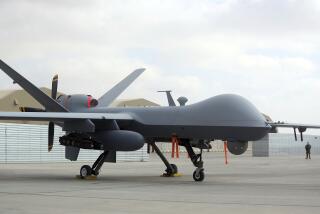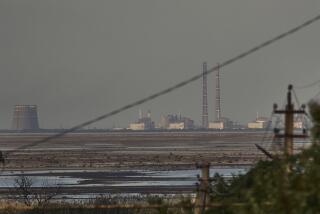Warns Against Attack on Chemical Plant : Moscow Cautions U.S. on Libya
- Share via
MOSCOW — The Soviet Union warned the United States on Wednesday that a military attack against Libya would represent “a serious blow” to the improving superpower climate.
The Soviet news media have been warning for several days of the possibility of a U.S. military strike against a Libyan factory south of Tripoli, the capital, that the Reagan Administration says is intended to produce chemical weapons.
Yuri A. Gremitskikh, a Foreign Ministry spokesman, told reporters that he had no immediate comment on the shooting down of two Libyan warplanes by U.S. Navy jet fighters over the Mediterranean.
The official Tass news agency carried a brief account from Tripoli that reported Libya’s condemnation of the American action. In a dispatch from Washington, Tass appeared to take a harder line, headlining the article, “Pentagon Justifies Act of Aggression.”
Speculation on Attack
The article suggested that the clash in the Mediterranean may be a prelude to an American attack against the Libyan plant.
“It is recalled here that the attack by U.S. bombers on Tripoli in April, 1986, under the pretext of combating terrorism, which caused numerous casualties among (the) civilian population, was also preceded by the U.S. Navy’s missile attacks on two Libyan patrol boats in the Gulf of Sirte (Sidra), which also allegedly threatened the U.S. armada,” the agency said.
Speaking about the chemical plant furor, Gremitskikh said: “In the obtaining conditions, any unprovoked action, from wherever it may emanate, would be a serious blow to the cause of improving the international climate.”
He said that such an attack “would undoubtedly be met with condemnation by the world community, including the Soviet Union.”
The Soviets maintain warm ties with the regime of Col. Moammar Kadafi and sell Libya hundreds of millions of dollars worth of military hardware every year. The two Libyan jet fighters shot down Wednesday were Soviet-built MIG-23s.
Behind in Payments to Soviets
Recently, though, the Libyans have reportedly fallen behind in their hard-currency payments to Moscow because of the drop in the price of oil, Libya’s biggest source of income.
The Soviet government’s approach to the Libyan question has been in general a cautious one, reflected in an article Wednesday in the Communist Party newspaper Pravda that attempted to show disapproval without criticizing the Reagan Administration outright.
“Libya has been chosen as an object for the American interference again, and not by coincidence,” the newspaper wrote Wednesday, before the clash between the U.S. and Libyan warplanes.
“For a long time the image of a ‘Libyan enemy’ has been imposed on ordinary Americans, along with the impression that the enemy had to be resisted with all means available,” the article said.
The Yugoslav news agency Tanjug quoted “reliable sources” as saying Wednesday that even before the incident between the U.S. and Libyan jets, Kadafi had asked the Soviet Union to use its navy to help prevent a U.S.-Libyan clash in the Mediterranean.
More to Read
Sign up for Essential California
The most important California stories and recommendations in your inbox every morning.
You may occasionally receive promotional content from the Los Angeles Times.










